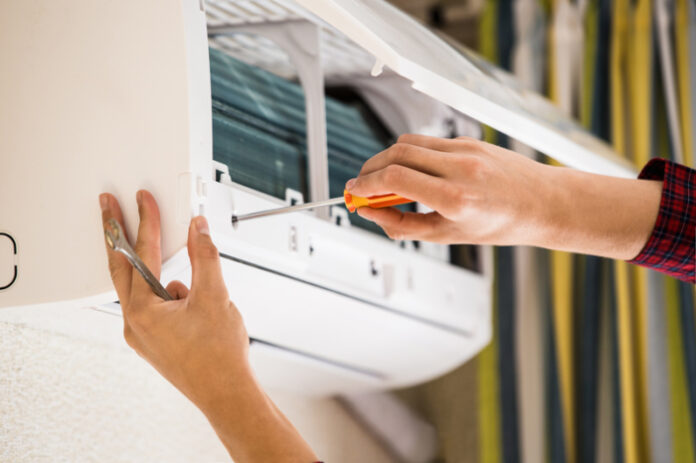
When an air conditioner stops cooling, it can turn a comfortable space into an uncomfortable one rather quickly, especially during the warm months of the year. Diagnosing and resolving cooling issues with your AC unit is a critical skill that can save time, money, and discomfort. Before calling in professional help, there are several troubleshooting steps one can take to potentially solve the problem.
Proper troubleshooting begins with understanding the common reasons an air conditioning unit might fail to cool a space effectively. These reasons range from simple issues like dirty air filters or incorrect thermostat settings to more complex problems such as refrigerant leaks or compressor malfunctions. Knowing where to start looking can often lead to a quick solution. The process of troubleshooting should be methodical, starting with the easiest and most common issues before moving to those that are more complex and less likely. This approach ensures that simple problems can be resolved without the need for expert intervention, while also preparing one to provide detailed information to technicians if the need to call one arises.
Diagnosing Common AC Issues
When an AC unit is not cooling, it’s essential to diagnose the issue accurately. Checking for airflow problems, identifying unusual sounds or smells, and verifying thermostat settings are critical first steps toward resolving the issue.
Assessing Airflow Problems
Airflow is fundamental to an AC unit’s performance. If there’s insufficient cooling, first check for any blockages or dirty air filters that can impede airflow. A clean filter is crucial for efficient operation. Another key area to examine is the condition of the coils and fins on the AC unit, ensuring they are not bent or obstructed. Inadequate cooling can also be a result of low refrigerant levels, suggesting a possible leak that needs professional attention.
Identifying Strange Noises or Smells
Noises and smells emanating from an AC unit can be indicative of underlying problems. For instance:
- A buzzing noise might suggest electrical issues,
- A squealing sound could indicate belt problems,
- Musty odors are often a sign of mold inside the ductwork or unit, which requires immediate attention to prevent health issues.
These symptoms require immediate investigation, with repairs potentially ranging from simple cleaning to component replacement or professional servicing.
Checking Thermostat Settings
An AC system’s thermostat is its command center. Incorrect settings can lead to cooling inefficiencies. Thermostat issues may include:
- Improperly set temperature controls, which need to be set lower than the room’s current temperature,
- A malfunctioning or uncalibrated thermostat, potentially requiring recalibration or replacement,
- Batteries that may need replacing in cases where the thermostat is not hardwired.
To ensure your system responds correctly, verify that the thermostat is set to “cool” and the fan is set to “auto”. If these settings are correct and issues persist, the thermostat may need to be checked by a professional.
Effective Solutions and Maintenance Tips
Maintaining an AC unit through regular care can prevent cooling problems while knowing when to call in professionals ensures the longevity of the system.
Routine Cleaning and Filter Replacement
Homeowners must regularly clean their AC units and replace the air filters. A clogged or dirty filter impedes airflow and reduces efficiency. Most manufacturers recommend changing filters every 30-60 days. Steps for replacing an AC filter:
- Power Off: Ensure the AC unit is turned off.
- Remove Old Filter: Slide out the old filter noting the arrows that indicate the airflow direction.
- Clean Area: Use a cloth to remove any dust from the filter slot.
- Insert New Filter: Place the new filter with the arrows pointing in the correct direction of airflow.
Professional AC Repair and When to Seek It
When routine maintenance isn’t enough, it’s time to seek professional help. If an AC unit is making unusual noises, emitting strange odors, or not cooling efficiently, homeowners should contact a licensed technician. In Las Vegas, specialized HVAC technicians are preferred over general plumbers for AC repairs. For more detailed information visit https://activeplumbingandair.com/ac-repair/.
- Signs you need a professional:
- Ice build-up on AC coils or exterior unit
- Frequent cycles or never reaching the desired temperature
- Water leaks around the AC unit
Seasonal Maintenance Practices
Adopting seasonal maintenance practices is key to keeping the AC operating at its best. Before peak temperatures hit, a spring check-up can tackle any potential issues.
- Spring Check-Up Tasks:
- Inspect and clean ducts and vents
- Check refrigerant levels for leaks
- Test thermostat function and replace batteries
Adhering to these seasonal practices helps ensure the AC unit functions properly throughout the year.
Find a Home-Based Business to Start-Up >>> Hundreds of Business Listings.














































